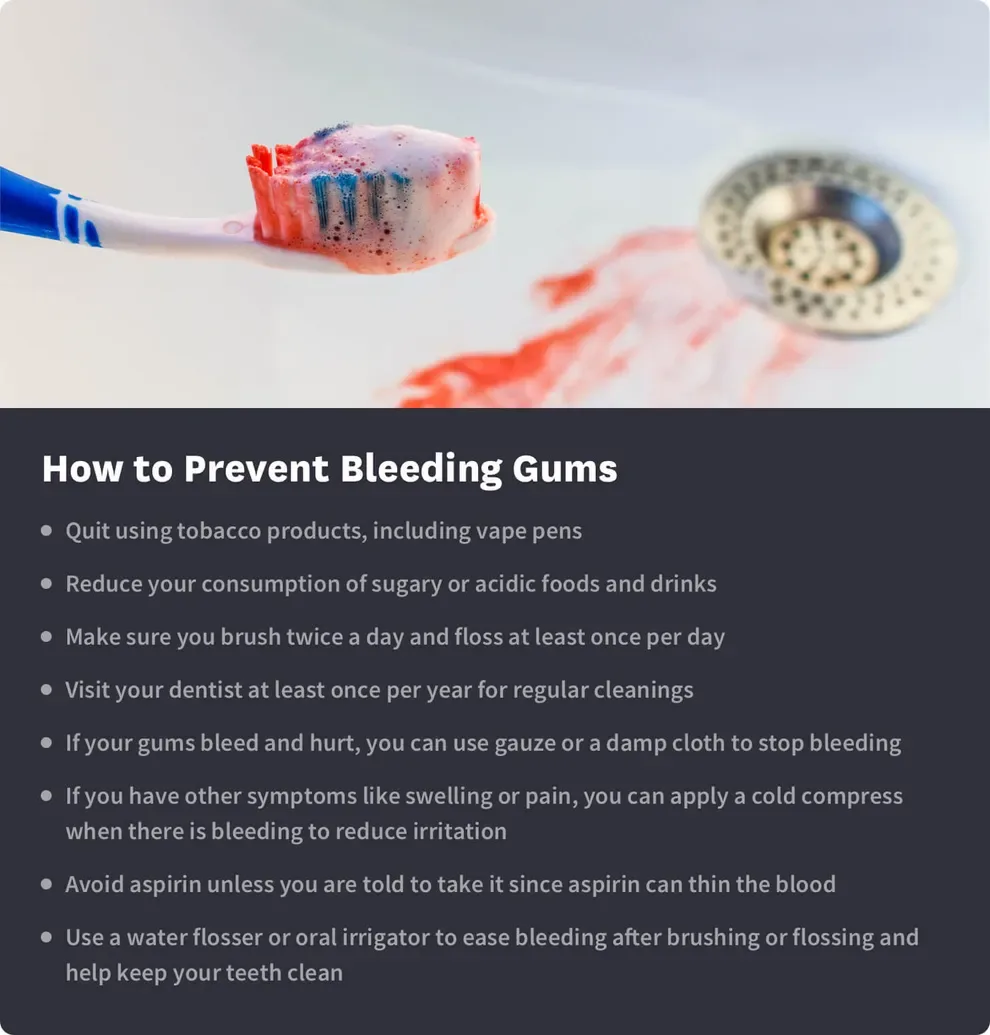Bleeding Gums: Tips on How to Treat & Prevent Future Bleeding

Table of Contents
- Causes
- Treatment
- Prevention
- References
Bleeding gums are best managed through good oral hygiene, such as gently brushing your teeth, flossing, and using a water flosser regularly.
Everyone’s gums bleed occasionally, but if your gums bleed often (when you brush your teeth, after eating, or for another reason), you may have an underlying condition. See a dentist, as they can help you determine the underlying cause.
Gum disease is the most common cause of bleeding gums, although dental appliances like clear plastic aligners that do not fit can also cause problems with your gums. Brushing too hard might cause bleeding, as can a chronic condition like a blood disorder.
Let your dentist know about any underlying conditions and medications, inform them if a dental appliance like dentures does not fit, and keep up a good oral hygiene routine.
Bleeding Gums: What Causes This Problem?
You may occasionally scrape or bruise your gums if you accidentally brush your teeth too hard or hurt your gums when you floss, which can cause a little bleeding. This is normal, but if your gums bleed consistently for any reason, you may have an underlying infection like gingivitis.
It is important to tell your dentist about consistent bleeding from your gums. They can look for gum disease and treat it before other problems, like tooth decay, occur.
Here are some of the other common causes of bleeding gums:
Bleeding disorders or being on blood thinners
Brushing too hard or too often
Hormonal changes, like those that occur during pregnancy
Improper flossing or flossing too hard
Leukemia or other blood cancers
Scurvy, or vitamin C deficiencies
Vitamin K deficiency
Dental appliances that do not fit, like dentures or clear aligners
Some of the listed conditions can cause gum sensitivity that can cause consistent bleeding, so if you have any of the above conditions, let your dentist know. They will still look for other signs of gum disease.
Treatment for Bleeding Gums
The best way to know what causes bleeding gums is to talk to your dentist. They can diagnose the cause and provide a treatment plan.
Dental appliances: If you have dentures, bridges, braces, or even clear teeth aligners, it is possible that they do not fit well, which can irritate your gums and cause bleeding. This irritation may also increase the risk of gum disease if your gums frequently bleed from cuts or scrapes since these can let bacteria into your gum tissue. Your dentist will refit your appliances and treat any underlying infection.
Brushing too hard: It is easy to think that harder bristles on your toothbrush or brushing with more force can get your teeth cleaner, but the opposite is true. Brushing too hard can cause your gums to recede, irritate and inflame your gums, and even make your gums bleed. Long term, this can lead to infection. If you bleed occasionally from brushing your teeth too hard, you can stop and follow advice from the American Dental Association (ADA): Get a soft-bristled toothbrush, and hold it at a 45-degree angle to your teeth. Brush gently for two minutes, twice per day. Be sure to floss at least once per day or use interdental brushes, which can be gentler on your gums than traditional waxed floss.
Chronic health problems: If you have an underlying condition like a blood disorder, a vitamin deficiency, or cancer, follow the treatment plan provided by your physician and specialists. Inform your dentist that you have an underlying condition, along with a list of any medications you take, as these can have an impact on your oral health.
Gum disease: Bleeding gums is one of the first signs of gingivitis, which can turn into periodontitis if left untreated. Your dentist can diagnose this condition and may recommend a deep cleaning, even beneath the gums. They may also prescribe antibiotics, either as a mouthwash or an oral capsule. They will then schedule a follow-up appointment to make sure the treatment plan is clearing the infection. A deep cleaning involves folding gum tissue back to clean the roots of the teeth directly. Plaque can build up in pockets between the gums and teeth, which get larger as infection progresses. Sometimes, irregular surfaces on the teeth are shaved down so bacteria are not harbored. This type of cleaning may require local anesthetic, and it takes a few hours to about one day to recover.
Preventing Bleeding Gums in the Future

There are steps you can take on your own to maintain good oral health and reduce the risk of gum disease that causes bleeding gums.
Quit using tobacco products, including vape pens.
Reduce your consumption of sugary or acidic foods and drinks, including fruit juice and alcohol.
Take vitamin supplements, especially if you are diagnosed with a vitamin deficiency.
Make sure you brush twice a day and floss at least once per day.
Visit your dentist at least once per year, or however often they recommend, for regular cleanings.
If your gums bleed and hurt, you can use gauze or a damp cloth to stop bleeding.
If you have other symptoms of gum disease like swelling or pain, you can apply a cold compress when there is bleeding to reduce irritation.
Avoid aspirin unless you are told to take it since aspirin can thin the blood.
Use a water flosser or oral irrigator to ease bleeding after brushing or flossing and help keep your teeth clean.
If your gums bleed once in a while, consider adjusting how you brush or floss your teeth, or temporarily avoid food that might irritate the area, like popcorn or crunchy chips. However, if your gums bleed regularly, inform your dentist and get an exam, as you may have an underlying infection causing gum disease.
